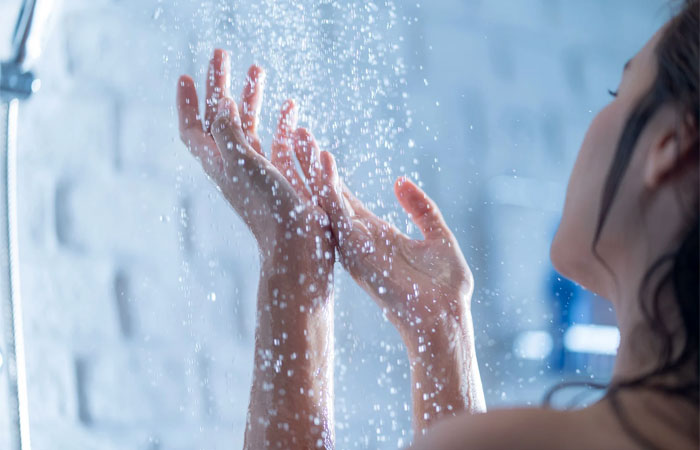
In pursuit of shampoo commercial-worthy hair, we often end up with a collection of shampoos and conditioners gathering dust in the corner of the shower because they just didn’t seem to work right.
If all of your hair care products are tailored to your hair’s texture and density and still don’t leave you with luscious locks, it can be frustrating. One possible factor that can render amazing products less effective is often overlooked, the state of your water.
No matter how simple or how elaborate your hair care routine is, if you have hard water, it can make a big impact on how effective that routine is.
Table of Contents
What is Hard Water?
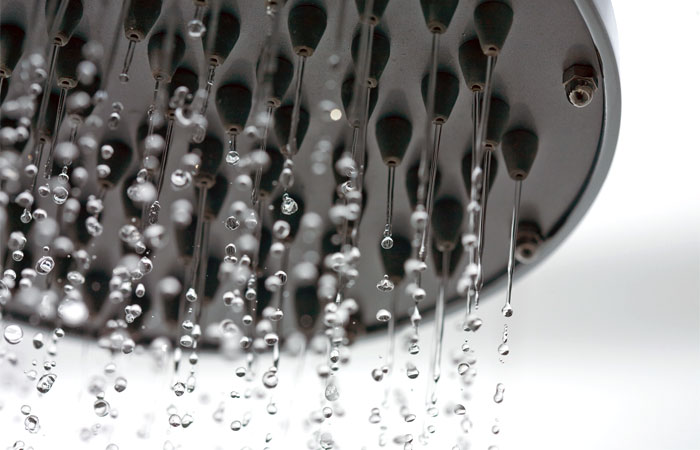
Hard water is water with a high content of “hard” minerals, such as calcium and magnesium. Whether or not your water is considered hard will depend on the concentration of these minerals.
Water with 7 GPG (grains per gallon) is considered hard. Each region has different concentrations of these minerals, so some cities will have hard water and will have soft. Other than municipal water, well water is another source of hard water and will typically have a higher concentration of these minerals.
While eating foods with minerals like calcium and magnesium are good for strong, healthy bones, having them in your water does not make for strong, healthy hair. Instead, the minerals are deposited onto your hair and scalp with every shower. They build up over time and can lead to damaged hair.
Is There an Easy Way to Tell If You Have Hard Water in Your House?
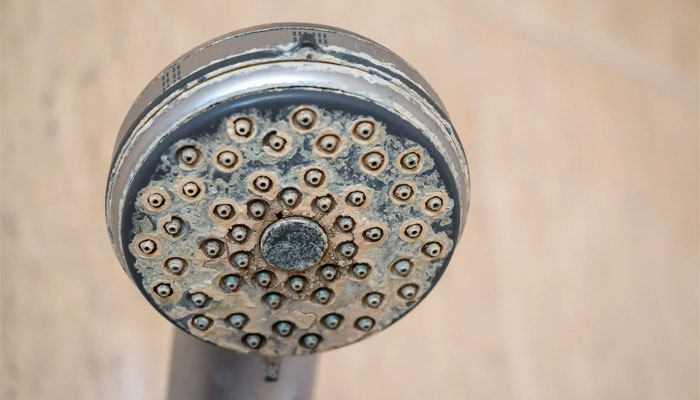
First, you can always check the water content in your region. That will give you the level of mineral concentration, and whether you have hard or soft water. But, if you want a quick answer, there are a few tell-tale signs that you have hard water in your house.
Take a look at the faucets in your bathroom as well as the showerhead. Hard water will leave a mineral build-up in these places that can be hard to scrub away. If these hotspots don’t give you answers, you can look at other places in the house.
If your glasses always come out of the dishwasher with spots, you might have hard water. Another place to check is the laundry room. If you often end up with mineral stains on your freshly washed laundry, it is likely you have hard water.
Also, if you have well water it’s probably going to be hard. It isn’t filtered as much as city water. So, while the municipal water might not be hard, water from a well probably will be.
What Does Hard Water Do to Your Hair?
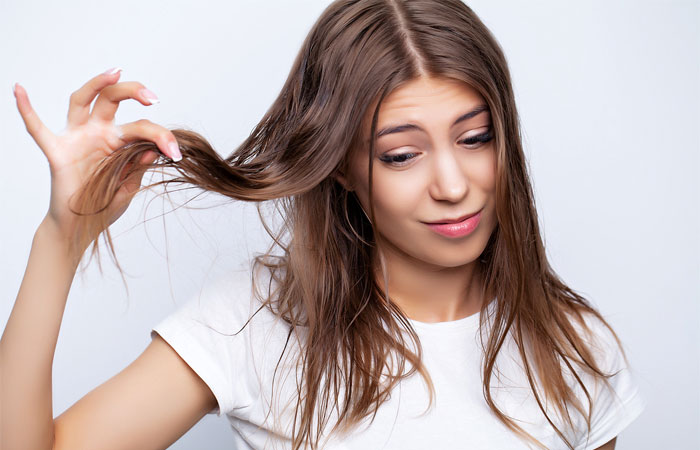
Hard water deposits minerals in your hair every time you wash it. Over time, this can build up and lead to damaged hair. Here are 5 signs of hard water on your hair.
1. Dry Hair
The minerals leave a film on the hair prevents moisture from getting in, leaving your hair dry. This means that even if you use the best moisturizing conditioners and hair masks, you could still end up with hair that feels like straw.
2. Limp Locks
The minerals can build up and weigh your hair down making it limp and lifeless. It can also make it look greasy even when you have just washed it.
3. Itchy Scalp
The minerals can build up and cause issues with your scalp too. They cover the scalp and dry it out, and can also block the follicle which will cause inflammation. Both of these will make the scalp itchy.
4. Thinner Hair
If it keeps building up, it can lift the cuticle of the hair shaft. That will make affect the elasticity of your hair, making it weak and brittle. Since dry hair becomes more easily tangled, trying to detangle brittle hair leads to breakage.
5. Faded Color
Hard water can wreak havoc on your hair color. Hair dye is deposited into the cuticle of the hair. Hard water prevents the cuticle from sealing, so your color can wash out easily.
If you spend a lot of money on appointments with your colorist, that is literally money down the drain since it will fade much faster.
See Also: 8 Hair Coloring Myths to Ignore
How to Counter the Effects of Hard Water
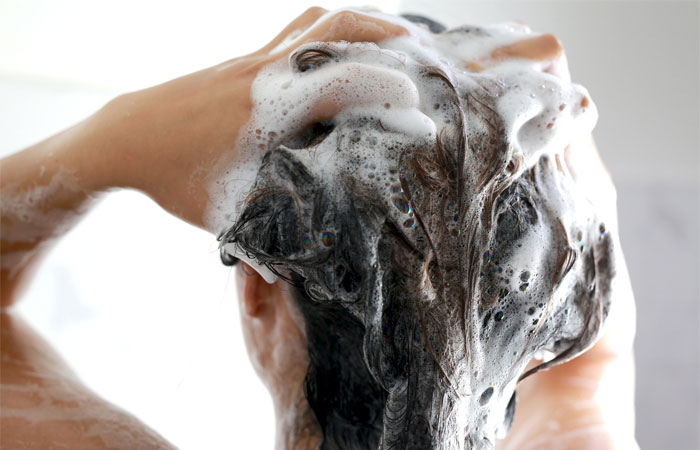
As much trouble as hard water can cause, there are ways to help fix it. Here are four great options:
1. Specialty Shampoo
The easiest fix is probably to get a clarifying or chelating shampoo. Moroccanoil is one we recommend.
These will clear everything out of your hair, including all of its moisture. So, they should only be used a few times a month, once a week maximum. Every time you use it, be sure to follow it with a very moisturizing conditioner or hair mask.
For an all-in-one solution, Malibu C’s Hard Water Wellness Kit is by far the most popular option and one of the best values out there.
2. Apple Cider Vinegar
If you enjoy homeopathic remedies or want to avoid a trip to the store, the solution might be in your pantry. Using an apple cider vinegar rinse after washing your hair can help clear it out.
Simply mix 1 tablespoon of vinegar with 2-3 cups of filtered water and work it into your hair. Leave it in for 3-5 minutes and rinse thoroughly.
3. Water Softener
If you have very hard water or well water, the best solution might be to get a water softener. There are systems that can be installed that will work for the whole house, turning that hard water into soft water. They can be very expensive, so keep that in mind. A good example is this Whirlpool model.
But in addition to helping your hair and skin, a whole-house water softener will reduce water spotting on your dishes and glassware, reduce mineral deposits around your sinks and faucets, keep showerhead nozzles clog-free, and reduce water spots from washing your car. In many regions, a water softener is a must.
4. Showerhead Filter
A similar remedy that is much more cost-effective is to get a showerhead that has a water softening filter in it or immediately before it. You may have to buy a few for the house to install in each shower, but it will make a big difference.
AquaBliss makes one of the better showerhead filters on the market. It’s more affordable than a whole house softener so you may want to try just one first and if you like the results, install one on the remaining showerheads in the house.
Final Thoughts
Spending a lot of time and money on trying to make your hair look just the way you want, yet having it not work, can be frustrating. Trying product after product to find the one that works and still end up with dry, dull, limp, or lifeless hair can make you want to pull those straw-like strands right out.
But before you give up and sentence yourself to a life of less than lustrous locks, check to see if you have hard water. The soft, flowing hair of your dreams might become a reality once you try one of these remedies.
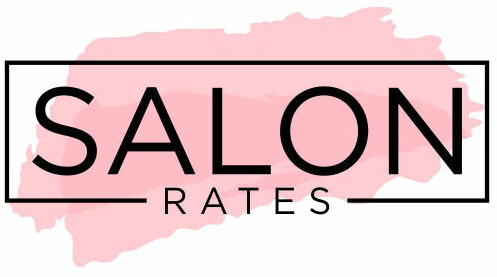
Thank you for explaining how water softener would be the best solution to very hard water. I’ve suspected that we have some for a while now because of our dry skin and hair, as well as soap scum buildup on our dishes. I’ll be sure to look into getting a water softener to see if that helps us.